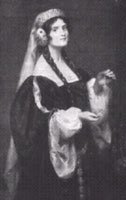Lady Marmalade
Royal Highness
- Joined
- Sep 2, 2005
- Messages
- 1,629
- City
- Chicago
- Country
- United States
Princess BellyFlop said:Gee... we all agree that if he marries a catholic he loses his place in line to the throne, due to a very old law. we are now questioning whether or not he still loses his rights if his Catholic girlfriend
converts to the Anglican church. Some say yeah others hum?
really? no kidding.... I was just voicing my thoughts on the subject.



